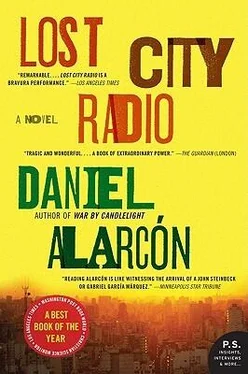She said she did. The very idea of it gave her chills. Her own show. Of course she got it.
“Need I mention Yerevan?” Elmer said, as a final warning. “Need I mention that he is no longer with us?”
She went on the air that first night with a dry, metallic taste in her mouth. Excitement, fear: things could go wrong, catastrophically, with a single phone call. The minister of state had called the station, to say that someone on his staff would be listening. The theme music, commissioned from an out-of-work violinist, played, and already Norma was sweating. Elmer was sitting in the sound booth with her, taking notes, paying close attention. Three — two — one:
“Welcome,” she said. “Welcome to Lost City Radio, to our new show. To all the listeners, a warm greeting this fine evening, my name is Norma, and I should explain a little about the show, since this is our first time.” She covered the microphone and took a sip of water. “No one needs to tell you that the city is growing. We don’t need sociologists or demographers to tell us what we can see with our own eyes. What we know is that it is happening rapidly, some say too rapidly, and that it has overwhelmed us. Have you come to the city? Are you alone, or more alone, than you expected to be? Have you lost touch with those whom you expected to find here? This show, my friends, is for you. Call us now, and tell us who you’re looking for. Who can we help you find? Is it a brother you’re missing? A lover? A mother or father, an uncle or a childhood friend? We’re listening, I’m listening…Call now, tell us your story.” She read the number of the radio station, emphasizing that it was a free call. “We’ll be right back after a short break.”
Cue music. Commercial. Norma could breathe again. No bombs yet. No explosions. “Well done,” Elmer said, without looking up. There were a few lines already lit up. They had been building up the show for a few weeks. The people were primed for this. The commercial began to fade. “Nervous?”
Norma shook her head no.
The engineer began his countdown.
“Now the fun starts,” said Elmer.
The first caller was a woman, whose thick accent said she was from the mountains. She spoke rather incoherently about a man she had known, whose name she could not recall at first, but who said he came from a fishing village whose number ended in three. “Can I say the old name? I remember the village’s old name.”
Norma looked up. Elmer was shaking his head.
“I’m sorry. You said the number ended in a three?”
It was all she had — was his name Sebastián? Yes, she was sure now and he came from the north.
“Is there anything more you can remember?” Norma asked.
“Sure,” the woman said, but it might get someone in trouble: private things, she said, there were dirty things. She laughed. This would be enough, she added. She would wait on the air for him to call back. She knew he would call. “I’m fifty-two years old,” she said slyly, “but I told him I was forty-five. He said he thought I looked even younger.” She spoke directly to her lover: “Honey, it’s me. It’s Rosa.”
Norma thanked her. She put the woman on hold, and the light blinked for a few minutes, then disappeared.
Meanwhile, there were others: mothers who called about their sons, young men about girls they had last seen in train stations or standing alone in the maize fields of their native villages. “The love of my life,” one man managed, just before breaking down, and in each case, it was Norma counseling, condoling, offering words of hope. “Are they thinking of me?” one woman asked of her missing children, and Norma reassured her they were. Of course they were. It was exhausting. Elmer was gleeful. The calls kept coming: from The Thousands and The Cantonment, from Collectors and Asylum Downs and Tamoé. Husbands confessed to have named their daughters after the mothers they hadn’t seen in a decade — but perhaps they were in the city now, perhaps they had found a way to leave that decaying village: Mother, are you here?
There were no reunions that day, but the calls never stopped. An hour after they had gone off the air, the phone kept ringing. Elmer twice changed the tape on the answering machine they had set up specially for the new show. He gave the two tapes to Norma the next morning. “For your listening pleasure,” he said. “You’re a hit.”
THE BEDS were prepared, the puzzle left unfinished, the lights turned low. Manau’s mother went off to bed, though not before giving kisses all around, and promising to knit the boy a warm hat. She asked what his favorite color might be, and he said it was green. She disappeared into a back room.
Norma still felt a buzzing within her. She wouldn’t be able to sleep. Even so, she said good night to Manau, then carried Victor to the sofa and tucked him in beneath a blanket. He didn’t resist being held. “What will we do tomorrow?” he asked.
“I’m not sure,” she said. It wasn’t just tomorrow she was concerned about; it was right now. Still, she told him not to worry. She sat in the armchair by the window. A dim yellow light came from the streetlamp. No cars passed. Curfew had begun.
It wasn’t long before Manau came. He said something about not being able to sleep. “Can I sit here?” he asked. She nodded, and he was mercifully silent.
She could guess some things by the boy’s age, but without Rey here to answer for himself, Norma was interrogating a ghost. Victor was eleven: where was I eleven years ago? Where was Rey? What were we like, and what wasn’t I giving him? She could kill him; if he were here, she would. At what point had their love become counterfeit? When had he begun to lie to her?
The most likely answer, she supposed, was that he had always lied. In one way or another. Hadn’t it been that way since the beginning? When they found each other again at the university, after his first disappearance, what was it he did? Remember, Norma, and spare him nothing. He pretended not to see me. Then, when you were there before him, unavoidable, human, flesh and blood, what was it he said?
“I’m sorry, do I know you?”
A fragile, tenuous lie; not that it hurt any less. Even now it made her angry, though it hadn’t at the time. It had shocked her. Left her speechless. She remembered now that moment of stark humiliation. She had imagined this meeting for months, had carried the missing man’s identification card in her purse at no small risk to herself — what if someone were to find it? And then to be dismissed so completely?
Later, he apologized; later, he explained: “I was nervous, I was afraid.” Later, he told her what he had lived through, but that day, it was all opaque, and she had to try very hard not to be disappointed, or not to let that disappointment show. He was not the man she’d met thirteen months before, certainly not the one she had recalled so fondly for so many nights, not the one she had daydreamed of while her parents fought like animals. He was quieter, thinner, less confident. His wool hat was pulled down nearly to his eyebrows, and he seemed to be wearing clothes that were not quite clean. There was nothing at all attractive about him that day they met again. What if she had walked away then? If she had handed him his ID and been done with it?
But that’s not what happened: instead, he lied, sadly, clumsily, and she stumbled on with her prepared speech. “I have something of yours.”
“Oh.”
She fished through her purse for it, and here, the moment she’d envisioned fell apart. The day had grown unexpectedly bright, and they were surrounded by students, strangers, noise. What was it her mother always said about Norma’s purse? “You could hide a small child in there. ” It was less a purse than an overflowing bag. A group of musicians across the way tuned up their instruments, preparing to play. Already a crowd was forming. Where was the fucking ID? Norma stammered an apology, and Rey just stood there, a bit uneasy, biting his lip.
Читать дальше












